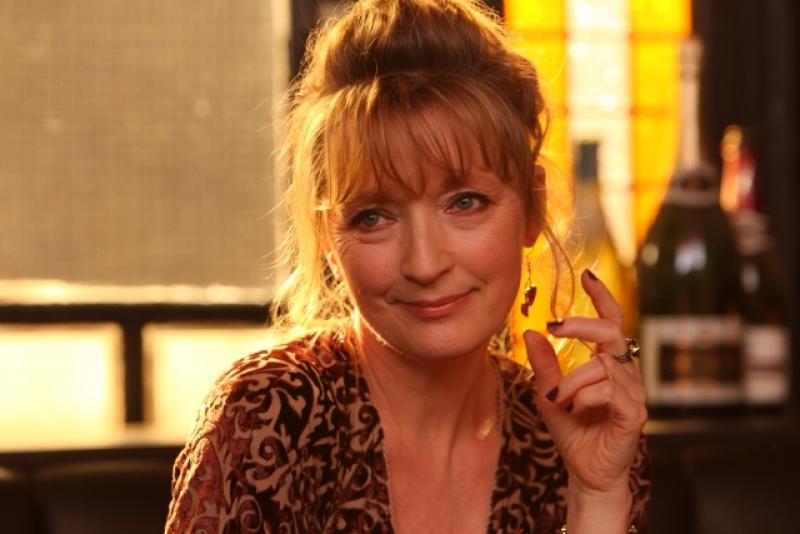Another Year | reviews, news & interviews
Another Year
Another Year
Mike Leigh's latest gives us the four seasons in varyingly autumnal shades

Mike Leigh's Another Year traverses the four seasons beginning with spring, and yet the mood is autumnal throughout. People don't sunbathe or picnic or build bonfires or for the most part respond in any particular way to the passage of time.
At first, you could be forgiven for thinking of Another Year as a direct rebuttal to its immediate predecessor in the Leigh canon: Happy-Go-Lucky (2008), a movie whose eternally chirpy, selfless heroine (played by the wonderful Sally Hawkins) exists in stark contrast to the clenched, tense close-up of Imelda Staunton with which this film starts. The camera zooms in on Staunton as if wanting to examine every anxious pore of someone whose apparent mantra - "Nothing changes" - would suggest that no human equivalent to the changing of the seasons is likely for her.
And then, in a daring move that may confound some, Leigh abandons this character never to bring her in again, the baton of distress passed to the fast-talking, heavy-drinking Mary (Lesley Manville), in the same way that Manville with this movie inherits the mantle of Acclaimed Leigh Actress that has gone previously to Hawkins, Staunton (Vera Drake) and Brenda Blethyn (Secrets and Lies). As was the case with those other women, Manville may have to start making room on her mantle for an awards trophy or two.
The actress, a London theatre stalwart who was terrific earlier this year in the Old Vic revival of Six Degrees of Separation, gets her breakout screen opportunity with this role and runs with it, in the process eclipsing arguably the film's most thoughtful, quietly devastating performance - that of Jim Broadbent playing the geologist, Tom, husband to Gerri, who is, in turn, Mary's abiding friend.
And how you ultimately feel about Another Year may in the end depend less on your response to Manville's self-evident bravura, at once fully rounded and funny and unsettling, but to the persistence of a character who keeps being spoken of as a great mate and yet would send many (very kind) people of my acquaintance running a mile in search of respite.
Mary, we soon discover, is the sort who shows up for lunch three hours late, chattering 10 to the dozen, and not always accurately, about places her hosts have been (or not, as the case may be). And woe betide Tom and Gerri's grown son, Joe (Oliver Maltman), for daring to bring home a serious girlfriend in the form of the chipper, eager-to-please Katie (Karina Fernandez). Mary has known Joe since he was 10 but can't keep from wanting a bit of the now 30-year-old lad for her (far older) self. That she doesn't succeed is giving nothing away beyond adding to the catalogue of disappointments that is this film's pervasive theme. Not for nothing has Leigh had a parallel career in the theatre: the various seasons function in cinematic terms as the four acts of a celluloid play, Chekhov's rueful spirit rarely far off.
 Sharing the landscape of loss and/or defeat are Tom's childhood pal, Ken (Peter Wight), who arrives in London for a visit from the North of England sporting a T-shirt that says "Less thinking, more drinking", and Ronnie (David Bradley, looking ashen), Tom's newly widowed older brother who gets absorbed into family life - Mary in her infinite variety included - down South.
Sharing the landscape of loss and/or defeat are Tom's childhood pal, Ken (Peter Wight), who arrives in London for a visit from the North of England sporting a T-shirt that says "Less thinking, more drinking", and Ronnie (David Bradley, looking ashen), Tom's newly widowed older brother who gets absorbed into family life - Mary in her infinite variety included - down South.
The movie's de facto rocks of Gibraltar are its Guardian-reading central couple, Tom and Gerri, and Broadbent and Sheen (pictured above) play together easefully like the Leigh veterans that they are. One could argue that Gerri is somewhat too saintly and that many of us would have snapped in frustration at Mary's self-destructive ways long before the seemingly infinitely patient Gerri ever registers a response. Or maybe it's that life's maelstrom is there to be glimpsed in the flashes of concern, alarm even, that pass across Broadbent's infinitely expressive face, rather like clouds scudding through an otherwise serene landscape.
The movie ends without recourse to melodrama or manufactured incident, preferring merely to move on from these characters in the same unfussy way that it allowed us access to them two hours earlier. Will Mary ever know the sort of contentment that Happy-Go-Lucky at least suggests is possible? There's a rhetorical question Another Year never directly asks, but if you need an answer, just consider the choice of season with which the film ends.
Watch the trailer for Another Year
rating
Explore topics
Share this article
Add comment
The future of Arts Journalism
You can stop theartsdesk.com closing!
We urgently need financing to survive. Our fundraising drive has thus far raised £49,000 but we need to reach £100,000 or we will be forced to close. Please contribute here: https://gofund.me/c3f6033d
And if you can forward this information to anyone who might assist, we’d be grateful.

Subscribe to theartsdesk.com
Thank you for continuing to read our work on theartsdesk.com. For unlimited access to every article in its entirety, including our archive of more than 15,000 pieces, we're asking for £5 per month or £40 per year. We feel it's a very good deal, and hope you do too.
To take a subscription now simply click here.
And if you're looking for that extra gift for a friend or family member, why not treat them to a theartsdesk.com gift subscription?
more Film
 Bugonia review - Yorgos Lanthimos on aliens, bees and conspiracy theories
Emma Stone and Jesse Plemons excel in a marvellously deranged black comedy
Bugonia review - Yorgos Lanthimos on aliens, bees and conspiracy theories
Emma Stone and Jesse Plemons excel in a marvellously deranged black comedy
 theartsdesk Q&A: director Kelly Reichardt on 'The Mastermind' and reliving the 1970s
The independent filmmaker discusses her intimate heist movie
theartsdesk Q&A: director Kelly Reichardt on 'The Mastermind' and reliving the 1970s
The independent filmmaker discusses her intimate heist movie
 Blu-ray: Wendy and Lucy
Down-and-out in rural Oregon: Kelly Reichardt's third feature packs a huge punch
Blu-ray: Wendy and Lucy
Down-and-out in rural Oregon: Kelly Reichardt's third feature packs a huge punch
 The Mastermind review - another slim but nourishing slice of Americana from Kelly Reichardt
Josh O'Connor is perfect casting as a cocky middle-class American adrift in the 1970s
The Mastermind review - another slim but nourishing slice of Americana from Kelly Reichardt
Josh O'Connor is perfect casting as a cocky middle-class American adrift in the 1970s
 Springsteen: Deliver Me From Nowhere review - the story of the Boss who isn't boss of his own head
A brooding trip on the Bruce Springsteen highway of hard knocks
Springsteen: Deliver Me From Nowhere review - the story of the Boss who isn't boss of his own head
A brooding trip on the Bruce Springsteen highway of hard knocks
 The Perfect Neighbor, Netflix review - Florida found-footage documentary is a harrowing watch
Sundance winner chronicles a death that should have been prevented
The Perfect Neighbor, Netflix review - Florida found-footage documentary is a harrowing watch
Sundance winner chronicles a death that should have been prevented
 Blu-ray: Le Quai des Brumes
Love twinkles in the gloom of Marcel Carné’s fogbound French poetic realist classic
Blu-ray: Le Quai des Brumes
Love twinkles in the gloom of Marcel Carné’s fogbound French poetic realist classic
 Frankenstein review - the Prometheus of the charnel house
Guillermo del Toro is fitfully inspired, but often lost in long-held ambitions
Frankenstein review - the Prometheus of the charnel house
Guillermo del Toro is fitfully inspired, but often lost in long-held ambitions
 London Film Festival 2025 - a Korean masterclass in black comedy and a Camus classic effectively realised
New films from Park Chan-wook, Gianfranco Rosi, François Ozon, Ildikó Enyedi and more
London Film Festival 2025 - a Korean masterclass in black comedy and a Camus classic effectively realised
New films from Park Chan-wook, Gianfranco Rosi, François Ozon, Ildikó Enyedi and more
 After the Hunt review - muddled #MeToo provocation
Julia Roberts excels despite misfiring drama
After the Hunt review - muddled #MeToo provocation
Julia Roberts excels despite misfiring drama
 London Film Festival 2025 - Bradley Cooper channels John Bishop, the Boss goes to Nebraska, and a French pandemic
... not to mention Kristen Stewart's directing debut and a punchy prison drama
London Film Festival 2025 - Bradley Cooper channels John Bishop, the Boss goes to Nebraska, and a French pandemic
... not to mention Kristen Stewart's directing debut and a punchy prison drama
 Ballad of a Small Player review - Colin Farrell's all in as a gambler down on his luck
Conclave director Edward Berger swaps the Vatican for Asia's sin city
Ballad of a Small Player review - Colin Farrell's all in as a gambler down on his luck
Conclave director Edward Berger swaps the Vatican for Asia's sin city

Comments
...